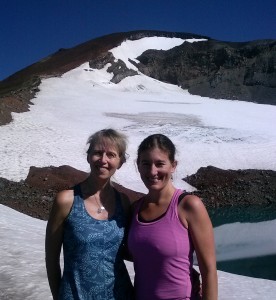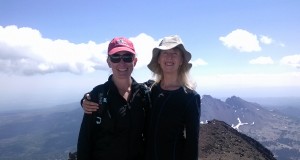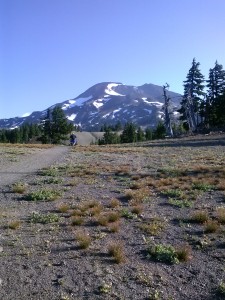What is the hardest thing you’ve ever done? What did you learn from it that you would pass on to others?
On Saturday my friend Colleen and I climbed South Sister, the third highest peak in Oregon at 10,358 feet. It was a 13 mile round trip and took us 10 1/2 hours. While I’ve always been

At Teardrop Pond, the highest lake in Oregon. I was probably the only person on the mountain in a dress (good hiking attire, highly recommended!). Colleen was the only one hiking with a coffee mug.
athletic and loved the outdoors, nobody who knows me would have said prior to Saturday, “Oh, Alison, she’s a mountain-climber”. And that’s the beauty of it. If I can climb tall mountains at age 52 then quite possibly you can, too. (Let’s remember this is the year in which children started asking me if I’m someone’s grandma.) Or your mountain might be a hard project, or a resolve toward personal growth, not a literal mountain. My experience is that the same principles apply.
1. Choose the right mountain, or the right hard thing. I didn’t choose Mount Hood (Oregon’s highest peak) to climb yesterday. I chose a mountain 2,000 feet higher than Mount St. Helens, the one we climbed last summer. If your hard thing is a work project, it might have been assigned to you without your having any choice. But often we can negotiate, for example, asking if we can add a certain component to our assignment to create more challenge. Or, if the challenge already seems too great, we might ask our boss if a skilled coworker could help. Which leads to the next tip.
2. Get help and give help. Climbing mountains and doing hard things are about interdependence, in my view, even though our culture thinks in terms of independence. Colleen planned the trip for the two of us – she is excellent at trip-planning, having planned and executed Habitat For Humanity trips for ten years. The young fellow at Columbia Sportswear helped me find the right hiking boots for my bizarrely narrow feet (he had narrow feet, himself, and knew which boots would lace in super-snug without buckling into folds). My husband researched which hydration pack had good consumer ratings. You get the picture. Lots of help.
On the other side of the equation, giving help is one of my favorite things to do. Colleen wasn’t feeling too well on the final ascent in the unstable volcanic scree, so I carried her pack up for part of it. When we debriefed the hike at our Devil’s Lake campsite that night, I realized that helping her out had been my best part of the day.
3. Train and prepare steadily. Mountains and hard things are all about preparation and making ourselves stronger. I trained for about two months by hiking the steep south slope of Mount Tabor, near my house, up and down, over and over each night after work, packing 1.5 gallons of water on my back. It hurt on the ascents, but in a good way. Which leads to the next point.
4. Embrace the discomfort — if it’s the right kind of discomfort. My experience is that climbing a mountain physically hurts. It breaks the boundaries of what a body normally does, the same way that a hard project breaks the boundaries of what our minds normally do. But I had no emotional reaction to the pain I felt on South Sister, because I was already familiar with it from my training. It was the right kind of discomfort. The wrong kind of discomfort to endure would be a sprained ankle, or an abusive boss or work environment. I don’t believe in enduring that kind of pain. It needs a different strategy; it needs to be fixed.
5. Pace yourself. Take breaks. Do this both with your training/preparation, and during the climb itself. Don’t blaze out of the starting gate with your mountain/hard thing, because that will leave you crawling at the end, and maybe unable to finish. Breaks let us catch our breath and regather our strength. Parcel out your energy the way you’d parcel out the food in your refrigerator if you had to make it last all month. Climbing a mountain and doing a hard thing are matters of putting one foot in front of the other, again and again. Keep showing up for the work, whether or not you feel inspired.

At the summit of South Sister, we feel elated - we did it! But we still have the second half of the hike ahead of us. It felt much longer than the exciting first half.
6. Stay vigilant to the end, not just to the peak of the experience. It’s normal to feel upon summitting a mountain that you’ve reached the goal, and now you can relax, because there’s only a little left to do. But reaching the summit means your hike is only halfway over. If you haven’t paced yourself, you’ll be so fatigued you could make a disastrous misstep on the descent. Plenty of people have died on descents. Remember that the summit, or the most exciting part of your project, is not the end of your effort. You’ve got to see the whole thing through.
7. Keep updating your mental map with new information. I learned this crucial principle from the excellent book “Deep Survival” by Laurence Gonzales. Like this post, he writes about outdoor challenges with an eye for the larger life-lessons that apply in any hard situation.
8. Have humility concerning the mountain/hard thing. A mountain and its weather, for example, are infinitely more powerful than we are. (This is a prime reason that mountain-climbing is a spiritual activity, in my view.) Do not get ego-involved, at least not when making decisions. Thinking this mountain/hard thing is the ultimate proof of your character or abilities is an example of being ego-involved (our character and abilities are shaped by all of our choices and actions). Doing a great deal of talking ahead of time about what you are hoping to accomplish may not be the best idea (doing is better than talking). Being humble and not ego-driven leads into the next principle:
9. Be willing to change your plan. If Colleen or I had gotten injured on the mountain, we would have cancelled the plan to summit, and gotten down off the mountain together. The same would have been true if a snowstorm had suddenly materialized. I actually experienced this in August ’75 when I was backpacking in the Sierra Nevadas with a church group. I felt spooked – it can’t snow in summertime! this is dangerous! – but our leader stayed calm and led us safely back out the next morning. He had more experience with mountains than I yet have. If your mountain is a hard project, has the leadership climate in your workplace changed? Do you need a different project strategy in response to that?

South Sister from several thousand feet below. Seems to me that hard things can be our greatest blessings.
10. Rest, reflect, and consider what mountain/hard thing you will embrace next. I feel wonderful today: light, strong, confident. I’m taking a few days off off from running, hiking or biking, to rest and center myself. I’ve been talking a little with Colleen and another friend about the next mountain. Mount McLoughlin, the tallest peak in Southern Oregon, which is my beloved work territory? Mount Adams, much higher than our past climbs?
Actually, what I want from these beautiful mountains is a small piece of their strength. There is no conquest of any kind going on here. My climbs are pilgrimages to places where I feel close to God. My friend Cindy, a mountain-climber and world traveler, wrote about “practicing spirituality through the soles of one’s feet” in the thesis that earned her an advanced degree from Stanford University. Cindy’s a wise woman.
What is the hardest thing you’ve ever done? What did you learn from it that you would pass on to others?



September 4, 2013
I was going back through some of your older blogs and I remember this was when I started following you!
August 12, 2013
What a fun experience we shared! I like your tip #6 especially, about focusing on the whole of the experience, not just the peak of it. A beautiful thing about being human (and a curse, sometimes) is our ability to “live” in the past, present and future all at the same time. In terms of doing something hard, it’s a good that we can do this. We can enjoy the moment — “Wow, what a beautiful view;” while also thinking of the past and future — “Those boulders were hard, so I’ll need to save enough energy to climb down them on the way back.” I think it doesn’t hurt, either, to think about how nice it will feel to be finished. Accomplishment is multi-faceted, and on long, hard endeavors of all kinds, it’s important to remember that overcoming stumbles and tumbles (both literal and figurative) along the way are indeed part of what makes challenges so, well, challenging — and satisfying.
August 7, 2013
Great post and congratulations on what sounds like an amazing climb.
Appreciating and reflecting on the accomplishment is probably one of the toughest parts of any good climb (mental or physical) I’ve been on. I’m generally in a race to the next summit. I think the reflection is not only central to learning from the experience but helps you to avoid future pitfalls.
August 8, 2013
Debra, I know what you mean. It seems to me that our writing/blogging may our strongest tool for reflection. I also think that the culture we live in is quite unreflective. For example, if it were reflective, we would not be consuming at the rate we are consuming, and creating the climate change we are creating. We have to step outside of the mainstream culture to reflect, and to live wisely and sensibly.
August 7, 2013
What a wonderful accomplishment and you should be very proud. I believe these tips are wonderful for every person because we each have our own mountain to climb.
August 7, 2013
Great advice, Congratulations on your hike!
August 8, 2013
The congratulations belong to you, Cory, for your 50 mile skateboarding commute. So well done.
August 6, 2013
I just swam my first open water race. I set a goal for myself at the beginning of the summer and have been working with a swim coach, practicing and slowly getting stronger. This weekend I swam in the 1000meter event at the Elk Lake Central Oregon Masters Association (the unfortunately named COMA) meet. I came in dead last but I finished and it was a beautiful swim in a gorgeous alpine lake. It was hard, yes, but I was prepared and steady. And, like you, I already have an eye toward the next event!
August 7, 2013
Oh my God, Christina, this is fantastic! Your first open water race! I am excited and impressed. Thanks for sharing this.
August 6, 2013
This was a terrific post in that I’m in my late 40’s now and you brought back a great memory. In our 20’s my best friend and I climbed Mount Rose (10,776 feet) which is just southwest of Reno, Nevada where we still live. I look up and see it every single day because it’s visible from 75% of the city. I have thought there is no way I could do that now. But, your post was very inspirational and I am going to re-evaluate that thinking and have my cup half full to going up it again! Thank you, Alison!
August 7, 2013
Way cool, Mike. Whether you do Mount Rose, a different mountain, or a non-mountain that deeply matters to you, I love hearing that you feel inspired.
August 6, 2013
This may sound kind of “lame” (pun kind of intended), but I don’t think I’ve ever seen the parallels between preparing for a taxing physical activity goal and preparing for a more cerebral or spiritual life goal. You’ve laid them out very clearly here — even for one of your probably more concrete readers.
August 6, 2013
Suzanne, I think you’re saying I effectively made the connection for you between challenges of body, mind and spirit. If I’m reading you correctly, then I’m glad to hear that, beloved concrete reader!
August 6, 2013
Congratulations! The hardest thing I’ve done is have to tell my mother, she will be in a long term care facility. That’s not likely on point here so some comments about your valuable insights to climbing a mountain.
In particular two points caught my eye. Training: anything physically taxing like this must have been, would require some prep time for sure. And reflection: so often we accomplish something we are striving for and keep on moving rather than reflecting and relishing in it’s success.
Over from LI group BHB
August 7, 2013
Patricia, I feel for you about your mother and telling her she has to move to a long-term care facility. I am thinking about writing a post on topics related to our physical declines, and how we deal with death. Thanks for visiting and weighing in.
August 6, 2013
That is an amazing accomplishment. I am very proud of you. I have always wished I had the strength and mentality to climb a mountain. I can only imagine the thrill and high you get from reaching the summit. I have had it on my bucket list and hope to accomplish it one day.
August 7, 2013
Mary, I don’t actually think you or anyone else needs to climb a literal mountain. Figurative mountains can be better. Dealing with climate change is, in my view, humanity’s biggest mountain ever, and much more important to scale than South Sister, Everest, etc.